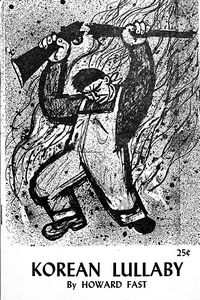Published by Current Book Distributors, Sydney, Australia. No date but circa 1950. 16-page booklet, illustrated covers, includes 8 poems regarding the Korean War, with most poems named for men: Vernon Blake, Rifleman; Harry Morgan, Machine Gunner; Arthur Dembrowski, Chemical Warfare; Al Carlton, Medic; Gerald Cartwheel, Tankman; Aaron Klein, Rifleman; Jamsie Anderson, Quartermaster. A very uncommon little booklet.
Paper wraps measuring 5.25 by 8 inches; several creases at corners of cover and pages, small tear at lower staple but cover is still well-attached; small tear at top cover corner, otherwise clean. Condition is Good+.
SE E D ERHARTS "Howard Fast's 'Korean Litany.'" War, Literature and the Arts, v.12, #1, Spring/Summer 2000.
Mr. Fast's fiction was always didactic to a degree, opposed to modernism, engaged in social struggle and insistent on taking sides and teaching lessons of life's moral significance, and he liked it that way.
"Since I believe that a person's philosophical point of view has little meaning if it is not matched by being and action, I found myself willingly wed to an endless series of unpopular causes, experiences which I feel enriched my writing as much as they depleted other aspects of my life," he said in a 1972 interview.
Mr. Fast was one of the 20th century's busiest writers, turning out more than 80 books — plus short stories, journalism, screenplays and poetry — in a career that began in the early 1930's.
His output was slowed but not entirely interrupted by the blacklisting he endured in the 1950's after it became known that he had been a member of the Communist Party and then refused to cooperate with the House Un-American Activities Committee. He served three months in a federal prison in 1950 for contempt of Congress, a charge arising from his refusal to produce the records of the Joint Anti-Fascist Refugee Committee.
Mr. Fast joined the party in 1943, a decision he often said was made at least in part because of the poverty he experienced as a child growing up in Upper Manhattan. He left the party in 1956, disillusioned by the Soviet Union's own stunning revelations of Stalin's terror and the spread of anti-Semitism there.
